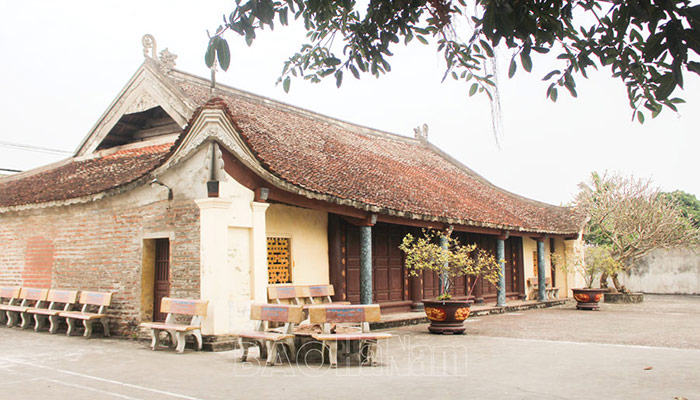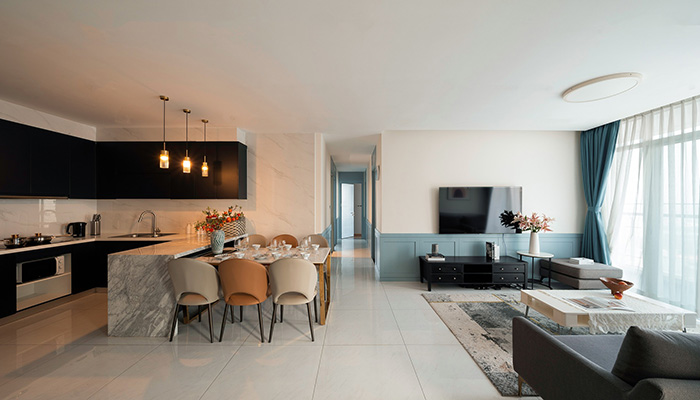The Architectural Beauty and Festivals of Dong Tru Communal House
Nestled in the tranquil countryside of Tien Thang Commune, Ly Nhan District, Dong Tru Communal House stands as a grand and majestic structure, its reflection shimmering on the surface of a serene lake, embraced by lush ancient trees. More than just an architectural marvel, Dong Tru Communal House holds deep historical and spiritual significance, representing the pride of generations of local residents.

Built during the Later Le Dynasty, Dong Tru Communal House showcases the elegance of traditional Vietnamese architecture. The structure consists of three main halls and two side chambers, featuring gracefully curved roofs adorned with intricate carvings of dragons, phoenixes, and floating clouds. These elaborate wooden engravings depict strength and resilience while maintaining a sense of harmony and fluidity.
The communal house exudes both sacredness and antiquity while blending seamlessly with nature. Positioned in front of a large lake, the site follows the feng shui principle of “front water, back mountain”, symbolizing prosperity and balance. These elements have earned Dong Tru Communal House its status as a National Cultural and Historical Heritage Site.
A Sacred Space of Worship and Devotion
Beyond its architectural grandeur, Dong Tru Communal House serves as a place of worship for six deities, including five generals from the Dinh Dynasty and a distinguished scholar from the Ly Dynasty.
Legend has it that the five deities of the Dinh Dynasty were extraordinary individuals, born under sacred omens, destined to assist Emperor Dinh Bo Linh in unifying the nation. They were half-brothers, each possessing unique talents and unwavering loyalty.
During the turbulent period of the Twelve Warlords Rebellion, these five brothers pledged their allegiance to Dinh Bo Linh, helping him restore order and usher in a golden era for Dai Co Viet. After their passing, they were honored as guardian deities, and the Dong Tru Communal House was erected as a tribute to their contributions.
The sixth deity enshrined in the communal house is Tran Ba Nghi, a distinguished scholar and military leader of the Ly Dynasty. Having passed the Third-Class Doctoral Exam, he was appointed by King Ly Thai Tong to lead military campaigns against invaders. Following his victorious return, he used his royal rewards to support local villagers, develop agriculture, and expand farmland. Even during his lifetime, he was revered as a guardian deity, embodying the virtues of a benevolent and righteous leader.
Dong Tru Communal House Festival – A Celebration of Northern Village Culture
In addition to its historical and architectural value, Dong Tru Communal House is renowned for its vibrant traditional festival, deeply rooted in local folklore. Previously held in the sixth lunar month, the festival has been moved to the fifteenth day of the second lunar month, aligning with the village pagoda’s festivities to create a grander celebration that attracts both locals and visitors.
A distinctive feature of the Dong Tru Festival is its inter-village participation, uniting three villages from the former Cao Da commune: Trung Ky, Phu Nhi, and Dong Tru. Every three years, these villages take turns hosting the festival, reflecting a strong sense of community solidarity and shared cultural preservation.
Traditional Rituals and Festive Activities
Sacred Ceremonial Rites
The festival consists of two main parts:
The communal house exudes both sacredness and antiquity while blending seamlessly with nature. Positioned in front of a large lake, the site follows the feng shui principle of “front water, back mountain”, symbolizing prosperity and balance. These elements have earned Dong Tru Communal House its status as a National Cultural and Historical Heritage Site.
A Sacred Space of Worship and Devotion
Beyond its architectural grandeur, Dong Tru Communal House serves as a place of worship for six deities, including five generals from the Dinh Dynasty and a distinguished scholar from the Ly Dynasty.
Legend has it that the five deities of the Dinh Dynasty were extraordinary individuals, born under sacred omens, destined to assist Emperor Dinh Bo Linh in unifying the nation. They were half-brothers, each possessing unique talents and unwavering loyalty.
During the turbulent period of the Twelve Warlords Rebellion, these five brothers pledged their allegiance to Dinh Bo Linh, helping him restore order and usher in a golden era for Dai Co Viet. After their passing, they were honored as guardian deities, and the Dong Tru Communal House was erected as a tribute to their contributions.
The sixth deity enshrined in the communal house is Tran Ba Nghi, a distinguished scholar and military leader of the Ly Dynasty. Having passed the Third-Class Doctoral Exam, he was appointed by King Ly Thai Tong to lead military campaigns against invaders. Following his victorious return, he used his royal rewards to support local villagers, develop agriculture, and expand farmland. Even during his lifetime, he was revered as a guardian deity, embodying the virtues of a benevolent and righteous leader.
Dong Tru Communal House Festival – A Celebration of Northern Village Culture
In addition to its historical and architectural value, Dong Tru Communal House is renowned for its vibrant traditional festival, deeply rooted in local folklore. Previously held in the sixth lunar month, the festival has been moved to the fifteenth day of the second lunar month, aligning with the village pagoda’s festivities to create a grander celebration that attracts both locals and visitors.
A distinctive feature of the Dong Tru Festival is its inter-village participation, uniting three villages from the former Cao Da commune: Trung Ky, Phu Nhi, and Dong Tru. Every three years, these villages take turns hosting the festival, reflecting a strong sense of community solidarity and shared cultural preservation.
Traditional Rituals and Festive Activities
Sacred Ceremonial Rites
The festival consists of two main parts:
- The Ritual Ceremony – A Solemn Tribute to the Deities
- The Holy Palanquin Procession – A symbolic bridge connecting the past with the present, and humanity with the divine.
- Offering Ceremony at the Communal House – A heartfelt tribute expressing gratitude to the deities for their blessings and protection.
- The Festive Celebrations – A Lively Display of Community Spirit
- Water Carrying Race – Young men race from the communal house to the Chau River, carrying water vessels on their shoulders, showcasing agility, endurance, and teamwork.
- Fire-Making Contest – Participants create fire using traditional bamboo friction techniques, symbolizing warmth, strength, and good fortune for the coming year.
- Rice Cooking Competition – Competitors carefully tend to open-flame stoves, ensuring their rice is perfectly cooked and fragrant, reflecting the traditional culinary skills of the past.
Beyond entertainment, these activities recreate scenes of traditional agricultural life, honoring the resilience and craftsmanship of past generations while preserving customs that have endured for centuries.
Dong Tru Communal House is not just a historical site; it represents cultural identity, spiritual devotion, and national pride. It safeguards unique architectural features, legendary historical narratives, and a lively festival atmosphere steeped in tradition.
Amidst the tranquil countryside, the communal house mirrors its stately presence upon the serene lake, creating a scene of both sacredness and serenity. Visitors cannot help but feel the harmonious blend of nature and heritage, where each step taken unveils a deeper appreciation for Vietnam’s rich past.
A visit to Dong Tru Communal House is more than a sightseeing journey - it is an exploration of heritage, a revival of pride in ancestral traditions, and a moment to cherish the timeless values passed down through generations.
Dong Tru Communal House is not just a historical site; it represents cultural identity, spiritual devotion, and national pride. It safeguards unique architectural features, legendary historical narratives, and a lively festival atmosphere steeped in tradition.
Amidst the tranquil countryside, the communal house mirrors its stately presence upon the serene lake, creating a scene of both sacredness and serenity. Visitors cannot help but feel the harmonious blend of nature and heritage, where each step taken unveils a deeper appreciation for Vietnam’s rich past.
A visit to Dong Tru Communal House is more than a sightseeing journey - it is an exploration of heritage, a revival of pride in ancestral traditions, and a moment to cherish the timeless values passed down through generations.

.jpg)








